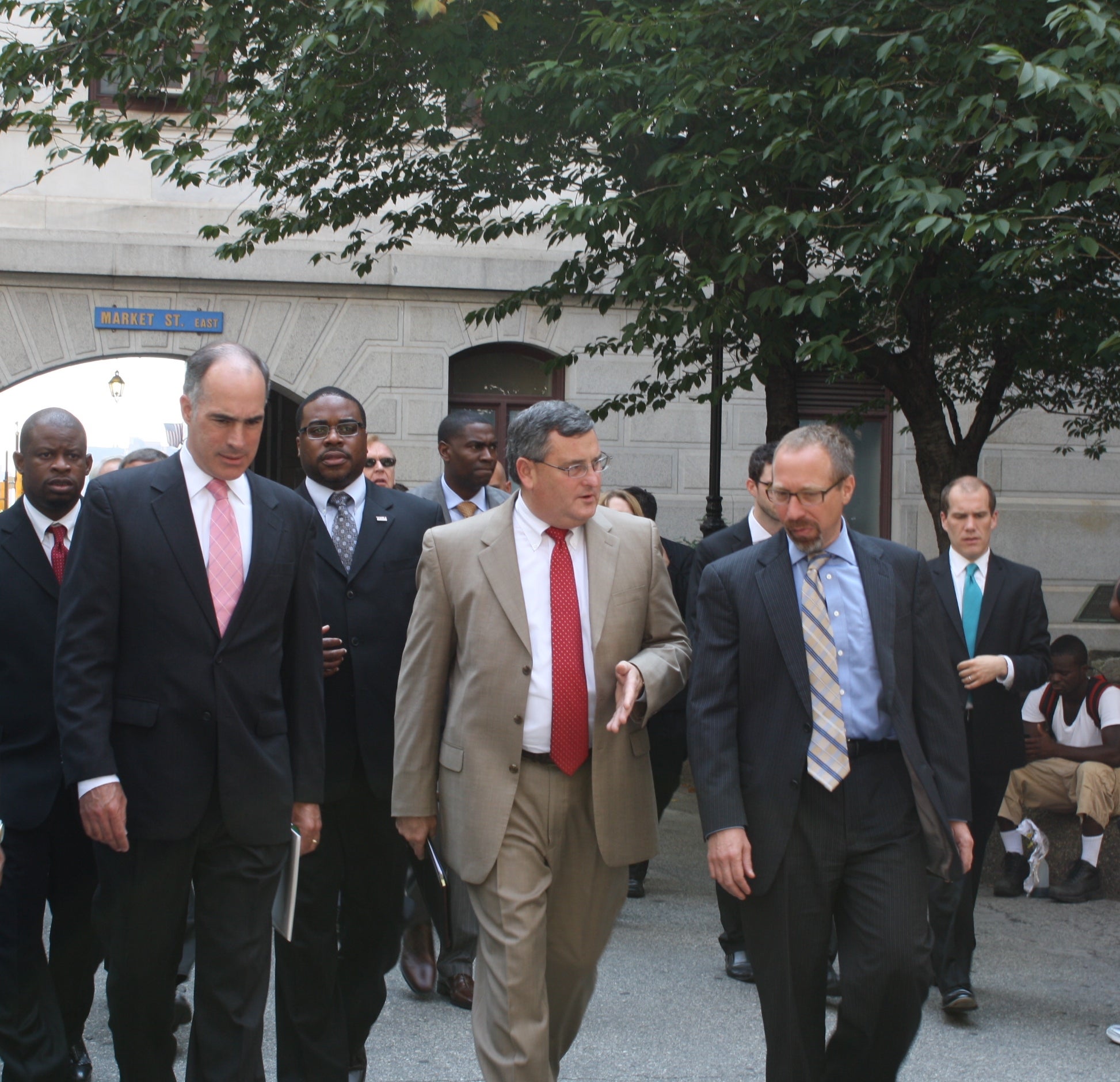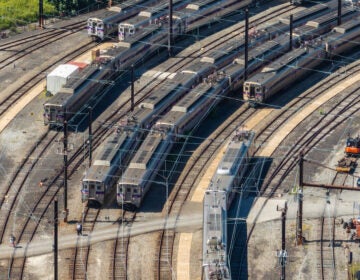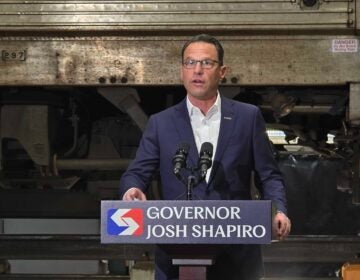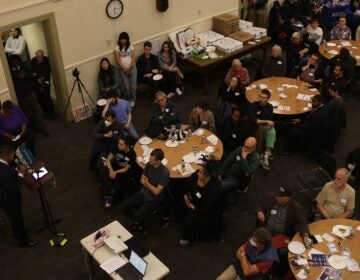Exit Interview: Outgoing SEPTA GM Joe Casey

After 34 years at SEPTA, the last (nearly) eight as General Manager, Joe Casey officially retired on September 30th. Not that he’s going anywhere far: Casey is just moving down the hall for now, staying on as a consultant through next year’s Democratic National Convention.
And after that? Casey doesn’t know for sure what’s next, but he knows it’ll have to be around here. “I’m a Philadelphian,” he told PlanPhilly during an exit interview on his tenure as SEPTA’s GM, how the authority has changed over the last three decades and what frustrated him most about running the nation’s sixth largest transportation agency.
Below are highlights from that interview. You can read an even longer version of the interview here. Both versions of the interview have been edited for clarity and condensed.
PlanPhilly: What was SEPTA like when you first started here back in 1982?
Joe Casey: I would say it was a bureaucracy. There was a lot of things being done the old fashioned way. I think the reputation of SEPTA was not necessarily at the high point. And back then, there was a lot of—even at the Board level—a lot of dispute and arguments between the various representatives on the board.
PP: Forbes listed SEPTA as one of the best employers, 33rd overall…. SEPTA takes a LOT of grief whenever a bus is delayed or a train is late. How do you have happy employees when people constantly berate them?
JC: From my perspective, I appreciate every employee that works here. I appreciate what they do: from my CFO to head of government affairs to my operators to the ones picking up trash for customers. I appreciate everyone and their commitment to serving the people in this region. I think my employees know that.
When I rolled out the customer service division – we needed to treat customers better. I can’t ask my employees to do it unless I treat them with the same level of respect and concern.
PP: What are the biggest challenges facing SEPTA today?
JC: Listen, the smart card project, that still has to be implemented, that’s a challenge. Number 2, all these capital programs that are going on, we need to fix them. The biggest thing we need to look at is capacity. We’re busting at the seams on the Regional Rail.
But I keep saying Regional Rail. We need to do the same for our trolleys. We need to get new trolleys and increase frequency there, too.
You have a younger population coming into Philadelphia. They don’t want to rely on cars. They want to use public transit and transit has to be responsive to that demand.
So, capacity is a big issue but at the same time we need to improve our facilities.
PP: How do you respond to criticisms that SEPTA spends too much attention and money on Regional Rail compared to the rest of the system?
JC: If you look at the last, I’d go back 20 years, if you look at the investments that we’ve made—we basically rebuilt the Market Frankford Line. We spent hundreds of millions of dollars. We rebuilt the stations on the Broad Street Line. And, in fact, very little has been done on the Regional Rail system.
Many of the stations on the Regional Rail line date back a century. It just so happens that there are a lot of the capital needs right now are on the Regional Rail system.
PP: After you were named GM, you created the Customer Service and Advocacy Division. And put it on the same footing on the org charge as things like Audits, HR, Operations, and Engineering – run by Assistant GM. Why?
JC: Well, I’m also a rider. And I have been since I was 14-years-old, taking the SEPTA system. I experience our system as a rider. What was obvious to me was that there was a disconnect between some of our employees and customers.
I said: “I want to communicate to customers, let them know we understand their experience.” We had to elevate that experience not only within SEPTA, but to customers. That had to be first and foremost.
Some of the concerns we get, we’re not exactly responsible: downed Amtrak lines down or PECO power problems, for example. But we still need to respond.
We also needed to change the way our employees treated our customers. But for our customers, we wouldn’t be here. We had to change that attitude. I think we’ve been moderately successful in that regard.
PP: You’re only 59, right?
JC: Something like that.
PP: That’s not retirement age. What’s next?
JC: We’ll see. Right now I just want to recharge my batteries and see what next. I don’t have any clear-cut plans. People have contacted me about his or that.
But I will not relocate. I won’t do that. I’m a Philadelphian. I want to stay in the area. My family is in the Philadelphia area. But we’ll see what happens. But you’re right: it is too early to retire.
PP: A criticism I’ve heard of transportation agencies in general is that they outsource engineering too often and don’t maintain large enough engineering departments. That, in turn, means outsourcing more work to expensive consultants, which raises costs. Any validity to that? Should SEPTA have more engineers on staff?
JC: It all depends on how you look at it. If you had a steady stream of capital dollars that you knew could come in and you could support it with engineering staff to do that work, then that’s the way to go. But when you have peaks and valleys in capital funding that doesn’t let you retain engineers for a sustained amount of time – or we can hire you this year, but not next – that doesn’t work as well.
PP: How difficult is it to run an agency like SEPTA when Congress can’t pass stable funding?
JC: It’s extremely difficult. For a major project, we need that commitment on a long-term basis.
PP: There is a bill to extend the Positive Train Control deadline back 3 years. Only SEPTA, Amtrak and Metrolink are on pace to have PTC installed by the deadline. Do you support the bill?
JC: Again, this was a safety issue. However, I think the deadline was very aggressive. So I think an extension is valid.
That being said: There was a requirement out there. We [SEPTA] purchased the radio spectrum early, entered into a contract early and we intend to get it done.
My concern overall: If the federal government passed a bill that came up with funding for agencies [that haven’t met the deadline], and then the people who actually implemented and took the matter of the law were shut out of that funding process because we already committed those dollars. That’s my biggest concern. You play by the rules, get it done and then funding goes to these people dragging their feet. We postponed a lot of major capital projects to meet this deadline.
PP: What non-obvious thing do you regret not being able to finish on your watch? So, not SEPTA Key.
JC: Well, from a timing standpoint, what I would have liked to do—and I think this is going to transform downtown Philadelphia—is redoing the concourse. You need to realize: the city owned the concourses, but we always get blamed. We get blamed for things that aren’t our responsibilities.
And this is a frustrating part of the job. A lot of things are outside of our control.
PP: Why is SEPTA Key hard to implement? Card systems seem to be ubiquitous. I can pay with cards at a corner bodega. Why is the technology difficult to implement on buses and trains?
JC: One explanation is, when you go and pay for the card at the grocery store, it’s all hard-wired. We have a system where it’s a moving vehicle. When you tap it, it has to be read, validated, make sure money on account, and deducted instantly on the vehicle. So you need to have a radio system and make sure it works all the time—no down time. So there’s that. And the sheer number of vehicles you have to outfit with this technology. It’s a little different.
It’s a lot different.
PP: I get what you’re saying, but I still feel like a lot of people won’t feel like that answer makes sense.
JC: If there was a vendor out there that could have done it in 3 months… again, these are experts in the industry. It’s not us. Were not dragging our feet. We want it done, we want it done right, but we’re not doing it. We have a major player installing this system for us.
PP: What parting advice did you give to SEPTA’s new GM, Jeff Kneuppel?
JC: We have a number of good employees here, a lot of talent. I said: utilize that talent. Create an atmosphere where they want to make change, they want to offer recommendations, they want to be involved in the decision-making process.
I think that’s what I’ve done. I’ve allowed people to make decisions, changes. And I can’t tell you how many times I’ve been in a meeting where I said I wanted to do this, and by the end of the meeting, we’re going in a completely different direction. I don’t’ care. I don’t need authorship. As long as we’re addressing the problems, I’m happy. I hope he takes that same approach.
WHYY is your source for fact-based, in-depth journalism and information. As a nonprofit organization, we rely on financial support from readers like you. Please give today.






